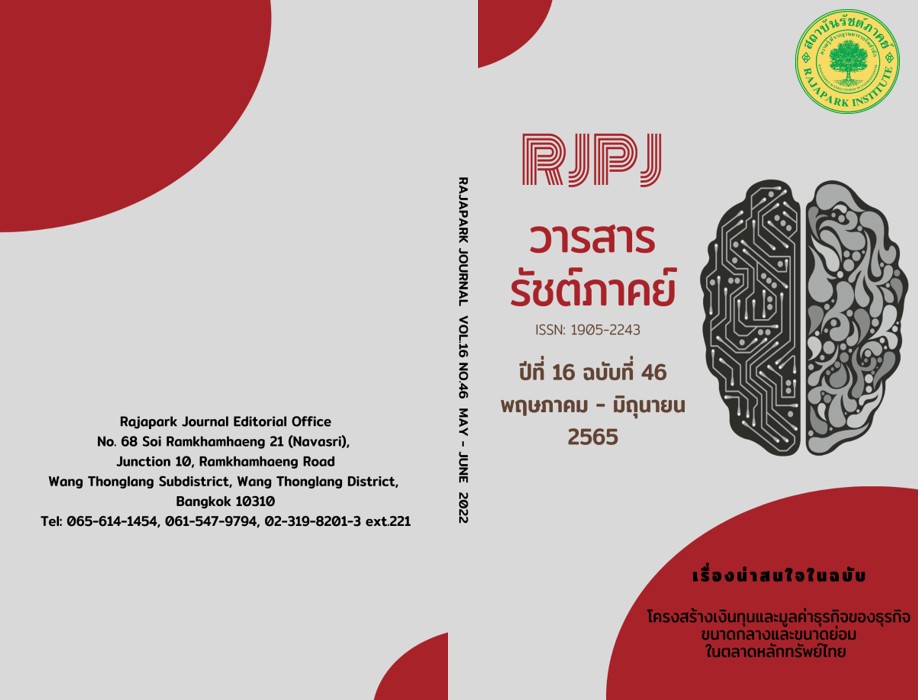ปัจจัยที่ส่งผลต่อประสิทธิผลการจัดการศึกษาเชิงบูรณาการของสถาบันรัชต์ภาคย์
Main Article Content
บทคัดย่อ
การวิจัยนี้มีวัตถุประสงค์เพื่อศึกษา 1) ปัจจัยที่ส่งผลต่อประสิทธิผลการจัดการศึกษาเชิงบูรณาการ 2) เปรียบเทียบระดับความคิดเห็นปัจจัยที่มีต่อประสิทธิผลการจัดการศึกษาเชิงบูรณาการ และ 3) เสนอแนวทางในการปรับปรุงพัฒนาการจัดการศึกษาเชิงบูรณาการของสถาบันรัชต์ภาคย์ กลุ่มตัวอย่างเป็นบุคลากรทางการศึกษาสถาบันรัชต์ภาคย์ จำนวน 40 คน การวิจัยเชิงปริมาณใช้แบบสอบถามเป็นเครื่องมือในการวิจัย มีค่าความเที่ยงทั้งฉบับเท่ากับ 0.87 ส่วนการวิจัยเชิงคุณภาพใช้การสัมภาษณ์ และการประชุมกลุ่มเป็นเครื่องมือในการเก็บรวบรวมข้อมูล ข้อมูลเชิงปริมาณวิเคราะห์ข้อมูลด้วยค่าความถี่ ร้อยละ ค่าเฉลี่ย ส่วนเบี่ยงเบนมาตรฐาน ส่วนข้อมูลเชิงคุณภาพวิเคราะห์ข้อมูลจากการสนทนากลุ่ม และใช้เทคนิคการวิเคราะห์เนื้อหา ผลการวิจัยพบว่า 1) ประสิทธิผลในการพัฒนาการจัดการศึกษาเชิงบูรณาการ ภาพรวมอยู่ในระดับมาก เรียงลำดับจากมากไปหาน้อย ได้แก่ ด้านค่านิยม ด้านโครงสร้าง ด้านยุทธศาสตร์/กลยุทธ์ ด้านพนักงาน/บุคลากร ด้านทักษะ/ความชำนาญ ด้านรูปแบบ/ลักษณะปฏิบัติ และระบบบริหาร 2) เปรียบเทียบปัจจัยที่ส่งผลต่อประสิทธิผลการจัดการศึกษาเชิงบูรณาการ จำแนกตาม เพศ อายุ ระดับการศึกษา สถานภาพบุคลากรในหน้าที่และประสบการณ์ในการปฏิบัติงาน พบว่า ไม่แตกต่างกันอย่างมีนัยสำคัญทางสถิติ 3) แนวทางในการปรับปรุงพัฒนาปัจจัยที่ส่งผลต่อประสิทธิผลการจัดการศึกษาเชิงบูรณาการของบุคลากรทางการศึกษา และผู้เกี่ยวข้องกับการกำหนดหลักสูตร มีความเหมาะสมกับแผนนโยบายหลักขององค์กร และสามารถนำไปใช้ให้เกิดประโยชน์กับหน่วยงานทางวิชาการได้อย่างมีประสิทธิภาพ
Article Details

อนุญาตภายใต้เงื่อนไข Creative Commons Attribution-NonCommercial-NoDerivatives 4.0 International License.
ทัศนะและความคิดเห็นที่ปรากฏในวารสาร ถือเป็นความรับผิดชอบของผู้เขียนบทความนั้น และไม่ถือเป็นทัศนะและความรับผิดชอบของกองบรรณาธิการ
เอกสารอ้างอิง
Anannawee, P. (2012). Principles, Theories of Educatinal Administration (4th ed.). Montree.
Charoenwongsak, K. (2013). Super Leadership. Success Publishing.
Chomchiangkham, S. (2003). Integrated teaching and learning management of Catholic schools[Master’s Thesis, Rajabhat Kamphaeng Phet Institute].
Kongsin, S., & Yafu, S. (2016). A study on academic administration of administrators in schools in Pichit Province under the Office of the Secondary Educational Service Area 41. Graduate School Journal, Chiang Rai Rajabhat University, 9(19), 141-154. https://so01.tci-thaijo.org /index.php/crrugds_ejournal/article/view/80619/64216
Weber, M. (1947). The Theory of Social and Economic Organizations. Free Press.
Mongkolvanich, J. (2013). Administration of Education Organization and Personnel. Chulalongkorn University.
Office of the Education Council Secretariat. (2017). National Education Plan 2017-2036. Prikwarn Graphic
Office of the Higher Education Commission. (2015). Higher Education Internal Quality Assurance Manual 2014. Parbpim.
Office of the Higher Education Commission. (2006). Higher Education Standards and Related Standards. Parbpim
Rajapark Institute. (2021). Human Resources Group. Annual report. Rajapark Institute.
Peters, T.J., & Waterman Jr., R.H. (2006). In Search of Excellence (Reprint ed.) Harper & Row.
Vogel, D.J. (2005). Is There a Market for Virtue? The business Case for Corporate Social Responsibility. California Management Review, 47, 19-45. https://doi.org/10.2307/41166315


